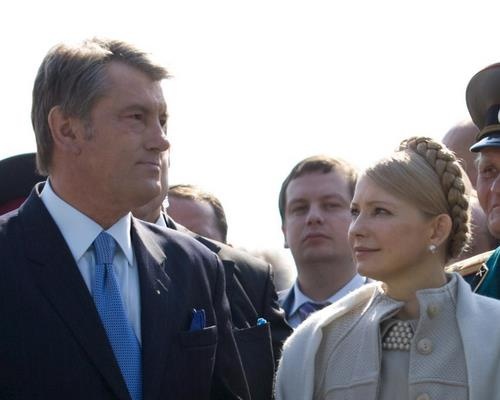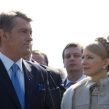
Who Will Washington Support in the Ukrainian Elections?
Publication: Eurasia Daily Monitor Volume: 6 Issue: 177
By:

The Ukrainian media has started to debate who the United States might support in the upcoming January 17, 2010 presidential elections. This issue is closely related to the question of which "political technologists" the presidential candidates will employ: American or Russian. On August 31 Alyona Getmanchuk, the editor of the weekly magazine Glavred, discussed "Washingtonski Stavky" -how the U.S. administration looks upon the three main presidential candidates.
Getmanchuk characterized Viktor Yanukovych, who leads in the polls, as someone over whom Washington still has reservations, because of his background in the Kuchma ancien regime, his low intellectual capabilities, and his authoritarian and Soviet cultural attributes. Washington also looks negatively at Yanukovych’s support for separatism in Georgia. Similarly, Getmanchuk found that "in the U.S. they do not see in a President Yanukovych any threat to Ukrainian independence" because no Ukrainian leader will willingly give up Ukrainian sovereignty. This is a reference to the fact that Kuchma came to power with "pro-Russian" slogans in 1994, but quickly became a Ukrainian derzhavnyk. However, what this comparison of Yanukovych and Kuchma ignores is that Yanukovych was born in Belarus and grew up in the highly Sovietized Donetsk where he was twice imprisoned, and as the Donetsk governor in 1997-2002 he oversaw the corrupt transition to a market economy that created oligarchs. In the USSR, Kuchma was head of Dnipropetrovsk’s Pivdenmash (Yuzhmash), the world’s largest producer of nuclear weapons and, therefore, a member of Ukraine’s communist nomenklatura (Glavred, August 31).
Getmanchuk analyzed Yulia Tymoshenko, who will most likely face Yanukovych in the second round of the elections. Getmanchuk developed the familiar canards about Tymoshenko’s "populism" that dominated Western coverage of her first government in 2005, but qualified this by saying that she is no longer seen in Washington as a "populist." Any analysis of Ukrainian party and presidential programs will show that they include "populist" promises, including Yushchenko’s 2004 program.
Getmanchuk pointed to one area where Washington might consider Tymoshenko as positive: her role in reforming and tackling corruption in the energy sector. Tymoshenko closed the corrupt gas intermediary RosUkrEnergo, which resulted in 2009 becoming the first year that Ukraine’s gas trade is not managed by a corrupt intermediary. Tymoshenko retains a larger number of skeptics than her supporters in Washington, Getmanchuk believes, because of her alleged "authoritarian" tendencies, and her unwillingness to compromise. However, like Yanukovych, Washington’s views of Tymoshenko, Getmanchuk suggested, are also in the process of changing.
Finally, he assessed Arseniy Yatseniuk (interestingly the analysis ignores President Viktor Yushchenko who received a rapturous welcome during his April 2005 visit to Washington where he was accorded the rare privilege of speaking to both houses of congress). Getmanchuk wrote that few in Washington know much about Yatseniuk, a factor that is unlikely to change before the election. Washington’s interest in Yatseniuk is in decline, Getmanchuk believes, in a comparable way to the plateauing of his support in Ukraine over the last four months after his meteoric rise in the previous six. Yatseniuk’s support in Ukraine and in the West has grown as a consequence of domestic disillusionment with Yushchenko, Tymoshenko and Yanukovych. One of his drawbacks, Getmanchuk believes, is that Yatseniuk has little charisma, appears arrogant and little is known about him or his policies (for example, it is now understood that he is less pro-Western than at first it was assumed). Another factor contributing to this declining interest is the widely held view that Yatseniuk will fail to enter the second round.
Getmanchuk’s analysis is complicated by the fact that Yatseniuk is the only main candidate using Russian "political technologists." The Ukrainian team of consultants, led by Kyiv Mohyla Academy Professor Rostyslav Pawlenko, was replaced by Russian consultants in June (www.proua.com, July 3). These Russian consultants were involved in preparing the anti-Yushchenko and anti-American propaganda in the 2004 elections for the Yanukovych campaign. They have also been blamed for the hugely unpopular Yatseniuk billboards and campaign tents in the center of most Ukrainian cities that use military camouflage colors to portray an air of crisis (www.arseniy.org).
Yanukovych, Tymoshenko, and Yushchenko use American election consultants (information about which is easy to find because U.S. companies working for foreign governments have to register with the Department of Justice Foreign Agents Registration Unit (FARA). Yanukovych draws on political consultants linked to the Republican Party, who unlike others working in Ukraine have never registered with FARA.
Yushchenko and Tymoshenko have drawn upon election consultants who have worked for Democratic election campaigns including Bill Clinton and Barack Obama. Tymoshenko’s team hired AKPD Message and Media, who played a central role in Obama’s successful public relations campaign. This undermined Yatseniuk believed by many (up to the culling of Ukrainian consultants), to be "Ukraine’s Obama" (see the picture of Yatseniuk as "Ukraine’s Obama?" on the front cover of the May issue of Business Ukraine magazine).
The AKPD contract became public knowledge with a lengthy analysis entitled "King Makers for Tymoshenko" in Ukrayinska Pravda (September 2-3). One of their first steps has been to re-fashion Tymoshenko on the internet (www.tymoshenko.ua and www.blog.tymoshenko.ua) and to have input into Tymoshenko’s billboards, widely seen as the best produced by all of the candidates that portray her competitors as arguing or undermining her, while she as head of government is busily working to extricate Ukraine from the impact of the global financial crisis. "They quarrel. She works," one of the billboards declares (Ukrayinska Pravda, September 10).
Tymoshenko has also managed to find support from Ukraine’s most well known rock bands, such as Druha Rika (who backed Yanukovych in 2004) and Vopli Vidoplyasova -a famous band in Ukraine that supported Yushchenko in 2004 and helped to popularize the Orange Revolution. The first of many rock concerts was held on the Maidan on September 12 attended by Tymoshenko and 50,000 spectators (Kyiv Post, September 17).
In Ukraine, discussions of "Washington" wrongly lump together the present administration, which officially will not support any candidate, think tank experts and private consultants employed by Ukrainian candidates or political parties. The Bush administration did not support a Ukrainian candidate in the 2004 elections, unlike Russia whose then President Vladimir Putin twice traveled to Ukraine to support Yanukovych.
Russian political consultants on loan from Putin, such as Gleb Pavlovsky, worked for the Yanukovych campaign. U.S. political consultants working for three Ukrainian candidates represent private companies, not the Obama administration. Nonetheless, this distinction appears lost on Ukrainian observers of U.S. foreign policy.




